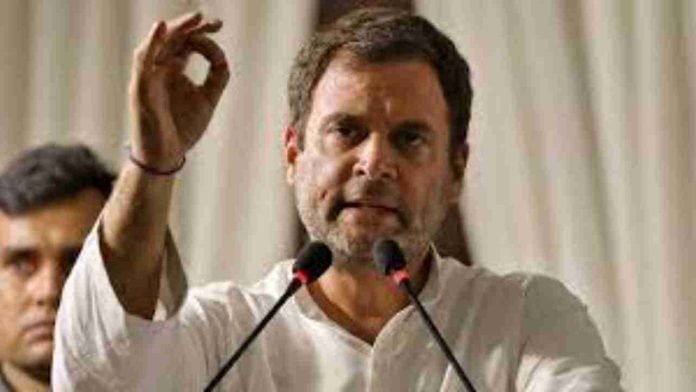The Supreme Court has issued notice on a plea by Rahul Gandhi seeking for the stay on his conviction and the two-year jail term imposed on him by a Gujarat court in a criminal defamation case for his remark “All thieves have Modi surname”.
A bench comprising of Justice BR Gavai and Justice Prashant Kumar Mishra have asked the respondents Purnesh Ishwarbhai Modi and the State of Gujarat for posting the case on August 4 case for further consideration.
The Court said to waive notice on behalf of respondent number 1. Mr Jethmalani for respondent 1 seeks 10 days time to file written submissions.
Justice Gavai, during the course of case, offered to recuse from the case citing the association of his father and brother with the Congress party.
The parties however did not raise any objection to Justice Gavai hearing the matter.
Senior Advocate Abhishek Manu Singhvi who appeared for Gandhi pressed for interim relief.
Advocate Singhvi said that the petitioner(Rahul Gandhi) has suffered for 111 days.He added that Gandhi has lost one parliament session and losing another.
The counsel also added that the elections to parliament constituency of wayanad would be shortly. Mr.Jethmalani would not be concerned by disqualification. An interim suspension of disqualification can be given.
The Court refused to pass any order stating that the respondents will also have to be heard.
The Court during the hearing observed that the order of the Gujarat High Court was unusually long for a matter seeking stay.
The bench remarked that there are over 100 pages in order. So detailed. What is there to file replies.. This is peculiar we are seeing to Gujarat courts.
Earlier on July 18, the Apex Court had agreed to hear Gandhi’s application after Senior Advocate Abhishek Manu Singhvi sought urgent hearing before a Bench led by Chief Justice of India D.Y. Chandrachud.
An instant appeal was moved by Gandhi challenging the Gujarat High Court’s refusal to stay the conviction for his remark “All thieves have Modi surname”.
On July 7, the Single-Judge Bench of Justice Hemant Prachchhak of Gujarat High Court had rejected the review petition filed by Congress leader Rahul Gandhi in a criminal defamation case that led to his disqualification from the Lok Sabha.
The High Court further refused to stay the conviction and two-year jail term awarded to the Congress leader.
It observed that staying the conviction was not a rule and the same must only be exercised in rare cases. The Bench noted that at least 10 criminal cases were pending against Gandhi.
The petition filed by Rahul contended that the offence of defamation under Sections 499/500 of the Indian Penal Code was attracted only with respect to a defined group.
It claimed that ‘Modi’ was an undefined amorphous group having about 13 crore people living in different parts of the country and belonging to different communities.
The plea further noted that the term ‘Modi’ did not fall in any category of association or collection of persons as stipulated under Section 499 of IPC.
The Congress leader claimed in the petition that he made the comment referring to Lalit Modi and Nirav Modi. The comment was specifically referring to certain specified individuals and the complainant, Purnesh Ishwarbhai Modi, could not be held to be defamed by the said remark, which was addressed in a specific context in reference to specific individuals.
On March 23, a local court in Surat district of Gujarat had convicted Congress MP Rahul Gandhi in a defamation case for his alleged remarks against Prime Minister Narendra Modi in April 2019.
The Court of Chief Judicial Magistrate H.H. Varma sentenced Gandhi to two years in jail and also imposed a fine of Rs 15,000 after finding him guilty under Sections 499 (Defamation) and 500 (punishment for Defamation) IPC.
Gandhi’s conviction under Sections 499 and 500 of the Indian Penal Code (IPC), both of which warranted a maximum sentence of two years, led to his disqualification from the Parliament, as per a Supreme Court order of 2013.


